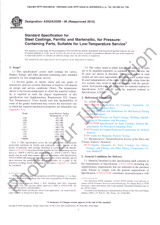Wir benötigen Ihre Einwilligung zur Verwendung der einzelnen Daten, damit Sie unter anderem Informationen zu Ihren Interessen einsehen können. Klicken Sie auf "OK", um Ihre Zustimmung zu erteilen.
ASTM D1976-20
Standard Test Method for Elements in Water by Inductively-Coupled Plasma Atomic Emission Spectroscopy
Name übersetzen
NORM herausgegeben am 1.5.2020
Informationen über die Norm:
Bezeichnung normen: ASTM D1976-20
Ausgabedatum normen: 1.5.2020
SKU: NS-995037
Zahl der Seiten: 15
Gewicht ca.: 45 g (0.10 Pfund)
Land: Amerikanische technische Norm
Kategorie: Technische Normen ASTM
Kategorie - ähnliche Normen:
Die Annotation des Normtextes ASTM D1976-20 :
Keywords:
aluminum, arsenic, antimony, barium, beryllium, boron, cadmium, calcium, chromium, cobalt, copper, digestion, dissolved elements, elements, inductively-coupled plasma atomic emission spectroscopy, iron, lead, magnesium, manganese, molybdenum, nickel, phosphorous, potassium, selenium, silica, silver, simultaneous determination, sulfur, thallium, total elements, total-recoverable elements, vanadium, zinc,, ICS Number Code 71.040.50 (Physicochemical methods of analysis)
Ergänzende Informationen
| Significance and Use | ||||||||||||||||
|
5.1 This test method is useful for the determination of element concentrations in many natural waters and wastewaters. It has the capability for the simultaneous determination of up to 29 elements. High sensitivity analysis and larger dynamic range can be achieved for some elements that are difficult to determine by other techniques such as Flame Atomic Absorption. 5.2 The test method is useful for multi-element analysis of domestic and commercial well produced drinking water for metals and nonmetals for use in baseline analysis and monitoring during exploration, hydraulic fracturing, production, closure and reclamation activities related to oil and gas operations (see Guide D8006). 5.2.1 Minimum analyses include arsenic, barium, iron, magnesium, sodium, calcium, manganese, and lead. 5.2.2 Boron, potassium, chromium, selenium, cadmium, and strontium may be required on a site specific basis. 5.2.3 The most abundant elements in oil and gas produced water are sodium, potassium, lithium, magnesium, calcium, strontium, iron, silica, phosphorus, and sulfur. 5.3 The test method is useful for multi-element analysis of acid rock drainage and other major and some trace elements in mining influenced water. 5.4 Where low quantitation limits are required, Test Method D5673 may be applicable. 5.5 The test method is also useful for testing leachates and effluents for ore and mining and metallurgical waste characterization tests including Test Methods D6234, E2242, D5744, and solutions from the Biological Acid Production Potential and Peroxide Acid Generation Methods in the Appendix of Test Methods E1915. |
||||||||||||||||
| 1. Scope | ||||||||||||||||
|
1.1 This test method covers the determination of dissolved, total-recoverable, or total elements in drinking water, ground water, surface water, domestic, commercial or industrial wastewaters,2,3 within the following concentration ranges of Table 1. 1.2 It is the user’s responsibility to ensure the validity of the test method for waters of untested matrices. 1.3 The values stated in SI units are to be regarded as standard. No other units of measurement are included in this standard. 1.4 This standard does not purport to address all of the safety concerns, if any, associated with its use. It is the responsibility of the user of this standard to establish appropriate safety, health, and environmental practices and determine the applicability of regulatory limitations prior to use. 1.5 This international standard was developed in accordance with internationally recognized principles on standardization established in the Decision on Principles for the Development of International Standards, Guides and Recommendations issued by the World Trade Organization Technical Barriers to Trade (TBT) Committee. |
||||||||||||||||
| 2. Referenced Documents | ||||||||||||||||
|
Empfehlungen:
Aktualisierung der technischen Normen
Wollen Sie sich sicher sein, dass Sie nur die gültigen technischen Normen verwenden?
Wir bieten Ihnen eine Lösung, die Ihnen eine Monatsübersicht über die Aktualität der von Ihnen angewandten Normen sicher stellt.
Brauchen Sie mehr Informationen? Sehen Sie sich diese Seite an.




 Cookies
Cookies
